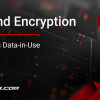Cryptographic Hardware vs. Software: Who Wins?

Fighting out of corner #1, with a career spanning 50+ years and 30 trillion secure transactions worldwide: cryptographic hardware! Cryptographic hardware encompasses secure cryptographic devices (SCDs) and hardware security modules (HSMs). Hardware is the undisputed heavyweight world champion in the ring of data security.
And fighting out of corner #2, the perennial contender found more often in local hard drives than enterprise infrastructure, we have cryptographic software! Cryptographic software is installed on client computers to perform specific cryptographic functions. While it’s the starting point for many organizations, its defensive gap lies in storing keys on the hard drive.
Read this article to gain an understanding of:
- The difference between hardware and software cryptography
- Performance, security, and compliance advantages of cryptographic hardware
- Common misconceptions about hardware vs. software
Hardware vs. Software
First, let’s define cryptography with hardware and software.
Hardware-based (sometimes called hardware-backed) cryptography is when you carry out cryptographic operations using dedicated hardware components in a physically secure device. In this model, data and encryption keys are stored in special hardware components.
With software-based cryptography, a software program performs cryptographic operations using the client CPU. Data and keys are stored in the computer’s hard drive, external storage device, or network storage. Meaning anyone with access to the hard drive can access the keys.
As you can see, the main difference is what handles the encryption: the computer’s CPU (software) or the cryptographic device’s specialized processing parts (hardware).
Common misconceptions
- “All cryptography is software-based.” Not so fast! Hardware-based cryptography physically protects and isolates components on the circuit board, providing better security.
- “Encryption is encryption whether you use hardware or software.” Not all encryption is the same. Having dedicated processors profoundly improves performance.
- “Software solutions are easier to deploy.” Ease is relative, especially considering the user-friendliness of cloud solutions, as well as cryptography providers’ ability to handle implementation on the user’s behalf.
Different deployment models
Hardware-based
Hardware-based cryptography is often implemented with hardware security modules (HSMs). HSMs are devices that contain dedicated cryptographic processors and storage chips. These specialized components are protected by tamper-responsive casings on the circuit board. HSMs have many functions but are particularly adept at encrypting data and storing encryption keys with security.
Software-based
Encryption software might perform similar use cases as an HSM—encryption, key management, digital signing, certificate management, etc. It does all this with your computer’s CPU, making it inherently more suited for small-scale deployments. Encryption software normally stores encryption keys on your computer’s hard drive, posing a major security risk should your computer become compromised.
Performance
Hardware-based
Hardware-based solutions like HSMs perform better than software-only solutions. They contain dedicated cryptographic processors that can execute complex encryption operations without draining your CPU’s resources. Your computer’s CPU already has to execute programs, load and save data, and perform routine calculations; making it responsible for your organization’s cryptographic security is not scalable.
Software
If you use a software solution to process transactions, encrypt data in transit, or manage keys for multiple applications, the CPU strain will eventually become a problem. Instead, cryptographic hardware performs those tasks with specialized chips on its circuit board.
In short, a hardware-based solution lets you offload all your resource-intensive processing demands.
Security
Hardware
HSMs have dedicated storage components that make their defenses impregnable. An HSM’s storage components are protected by tamper-responsive casings installed on the circuit board, shielding them from physical intrusion. This physical security, combined with an HSM’s inherent logical security, keeps your cryptographic keys as safe as possible.
Software
Software solutions tend to store encryption keys on a local hard drive or network. Anyone who gets access to the hard drive gets access to the keys. If an unauthorized party compromises an organization’s top-level keys, they gain access to all the other keys and data encrypted under those top-level keys. That’s an instant KO.
Compliance
Hardware
Not only is cryptographic hardware a good idea—it’s often a requirement. Many organizations in the payments, healthcare, or government sectors must use HSMs to comply with regulatory standards like PCI, HIPPA, and GDPR. Data security standards favor HSMs for their robust physical and logical security. Organizations that handle highly sensitive data (like payment credentials or PII) have the obligation to safeguard it. Compliance standards exist to certify that they’ve done just that.
Software
With compliance, software-based cryptography is outclassed. It lacks the physical security that a hardware-based solution provides. Compliance standards are the framework for keeping data safe around the world.
Who wins?
No matter how you look at it, at the end of the day, hardware remains the heavyweight world champion of data security. With enhanced performance, stronger security, and effortless compliance, hardware-based cryptography takes the gold.
FAQ
What are the main differences between hardware-based cryptography and software-based cryptography in terms of operation and security?
The main differences between hardware-based cryptography and software-based cryptography lie in how they handle cryptographic operations. Hardware-based cryptography utilizes dedicated hardware components in physically secure devices, with data and encryption keys stored in special hardware components. On the other hand, software-based cryptography relies on a software program that performs cryptographic operations using the client CPU, with data and keys stored on the computer’s hard drive, external storage device, or network storage. The primary distinction is in what handles the encryption: specialized processing parts in cryptographic devices for hardware, and the computer’s CPU for software.
How do hardware security modules (HSMs) improve performance, security, and compliance over software-based cryptography?
Hardware-based cryptography, particularly with hardware security modules (HSMs), provides enhanced performance, security, and compliance compared to software-based cryptography. In terms of performance, HSMs contain dedicated cryptographic processors that can execute complex encryption operations without taxing the computer’s CPU resources. Security is bolstered by the physical protection of HSM components through tamper-responsive casings, making the defenses impregnable against physical intrusion. Compliance advantages arise from the fact that many organizations, especially in sectors like payments, healthcare, or government, are required to use HSMs to meet regulatory standards such as PCI, HIPPA, and GDPR.
When and why is cryptographic hardware, like hardware security modules (HSMs), mandated by compliance standards in specific industries or scenarios?
The use of cryptographic hardware, specifically hardware security modules (HSMs), is considered not just a good idea but often a requirement in industries dealing with highly sensitive data. This includes organizations in the payments, healthcare, or government sectors. Compliance standards, such as PCI, HIPPA, and GDPR, favor HSMs due to their robust physical and logical security measures. Organizations handling sensitive data are obligated to safeguard it, and compliance standards certify that using HSMs contributes to meeting these obligations, ensuring the protection of data around the world.






